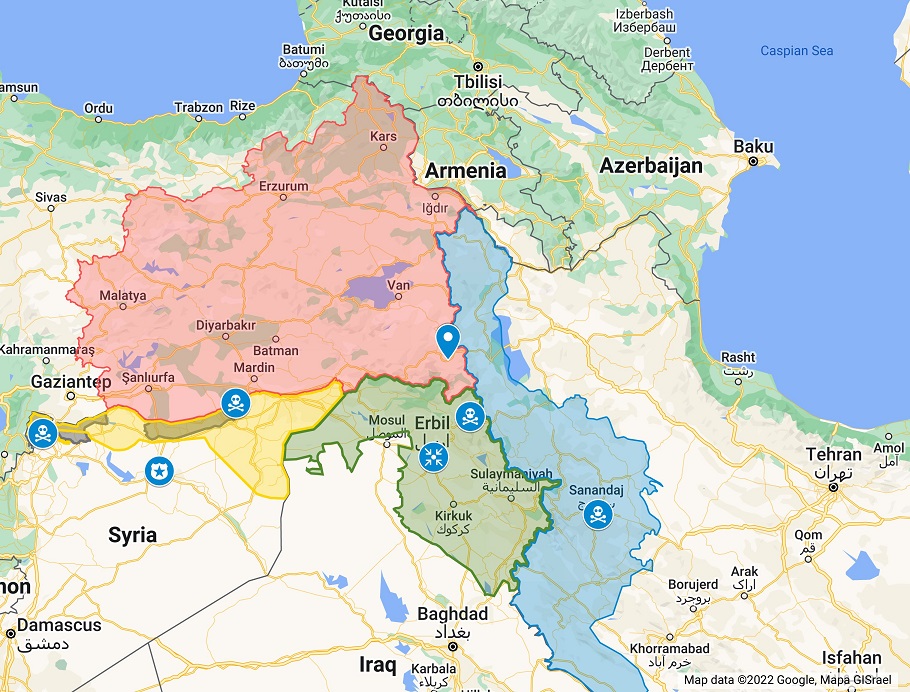1.5K
Iran
- Iran’s anti-government protests entered their fourth week despite the regime’s ongoing violent crackdown on demonstrators and civilians. Iranian authorities, most notably the Islamic Revolutionary Guard Corps (IRGC), have killed at least 200 people across Iran, mostly in Sistan and Baluchestan Province and Iranian Kurdistan. Among the regime’s victims are 19 children and an activist Iranian authorities tortured to death. The Hengaw Organization for Human Rights reported that Iranian security forces arrested at least 200 more Kurdish activists, teachers, students, and artists last week. The Iranian regime has now detained at least 2,000 since the protests began. Concurrently, the IRGC deployed thousands of its Basij forces to several Kurdish cities, including Sena, Saqqez, and Salas Babajani, on Monday morning. The Basij used armed bikers to attack protesters, break up gatherings, and intimidate locals. Also, on Monday, US National Security Adviser Jake Sullivan criticized the Iranian president for describing the protestors as “flies” and said, “These protestors are Iranian citizens, led by women and girls, demanding dignity and basic rights. We stand with them, and we will hold responsible those using violence in a vain effort to silence their voices.” On Thursday, the US Department of the Treasury’s Office of Foreign Assets Control (OFAC) sanctioned seven Iranian officials for shutting down Iran’s internet access and perpetrating violence against peaceful protesters. Further, the European Parliament adopted a resolution calling for the sanction of Iranian assets and officials. Likewise, the United Kingdom sanctioned Iran’s morality police and several security officials linked to the regime’s ongoing campaign of repression.
Iraq
- The IRGC continued targeting Iranian Kurdish opposition groups in Iraqi Kurdistan with artillery last week and struck several sites near Bradost Mountain. According to Rudaw, the IRGC’s attacks have displaced at least 4,500 Kurds and forced the evacuation of seven villages. Iranian officials have repeatedly vowed to keep attacking Iraqi Kurdistan until the Iraqi government and Kurdistan Regional Government (KRG) expel the opposition groups that have been based in Iraq since 1991. Concurrently, the IRGC replaced the Iranian Army (Artesh) along much of the Iran-Iraq border. Iran’s Kurdish parties have thrown their support behind the ongoing protests but, despite the Iranian regime’s accusations, do not support their militarization. Meanwhile, the Kurdistan Parliament’s Peshmerga Affairs Committee visited several areas struck by Iranian shelling on Sunday to prepare a report on Iran’s violations of Iraq’s sovereignty. At the same time, the Arab Parliament voted to approve a statement condemning Iran’s attacks on Iraq. Iraq was the only member of the Arab League to disapprove of the resolution.
- Iraq’s Speaker of the Council of Representatives, Mohammed al Halbousi, and members of the newly established “State Administration Coalition” met with Kurdistan Democratic Party (KDP) head Masoud Barzani in Erbil. The two parties discussed the election of a new president and ongoing efforts to form a new government. “The participants agreed to study these sensitive issues and reach a solution before the parliamentary session on this issue,” read a statement from Barzani’s office. Several political observers claimed the Iranian-backed Coordination Framework is pressuring the KDP and the Patriotic Union of Kurdistan (PUK) to agree on a new presidential candidate. On Tuesday, Speaker Halbousi announced the selection of a new president for Thursday’s parliamentary session. The KDP and PUK remain at odds over the selection of a presidential candidate, and the PUK refuses to endorse the KDP’s suggestion that the Kurdistan Parliament hold a vote to decide the matter.
Syria
- A leader of the Turkish-backed Faylaq al Sham in the occupied Afrin admitted raping a 14-year-old Kurdish girl Zainab Omar and killing her last spring. The terrorist leader Salah Ara’r pressured another Kurdish girl to admit that she was the murderer of Omar. Moreover, the Syrian Observatory for Human Rights (SOHR) reported the arrest of nine Kurds for ransom by Failaq al Sham and the Sultan Murad terrorists in Afrin.
- The Syrian Democratic Forces (SDF) announced the arrest of two ISIS (Da’esh) terrorists in al Sabkhah and al Raqqa, responsible for distributing weapons and logistical aid for the terror group. Separately, the Turkish forces and its Syrian proxies attacked the Zargan town with 438 rockets and mortars in ten days, wounding five civilians and causing property damage to civilian homes. Simultaneously, the bombardment on Ain Essa and Tal Tamer continued for days.
Turkey
- The Pro-Kurdish Peoples’ Democratic Party (HDP) held rallies in several cities demanding the end of the isolation imposed on the imprisoned Kurdish leader Abdullah Ocalan. The security forces’ violent crackdown on protests wounded Kurdish lawmaker Habip Eksik in the Yüksekova district of Hakkari province. The lawmaker ended up in the hospital with broken legs and a nose injury, raising anger among HDP supporters. “The instigators and perpetrators of this violence are, first and foremost, the Minister of the Interior and the Ministry of Internal Affairs. We also know there is no point in telling a minister with mafia affiliation,” read a statement by the HDP describing the attack “on the Kurdish people.” The Turkish police also arrested thirteen Kurdish student demonstrators in Izmir and Manisa.
- The Turkish Foreign Minister Mevlüt Çavuşoğlu affirmed Turkey’s plans to normalize relations with the Syrian regime. On October 11, Çavuşoğlu said:” the opposition and regime need to come to an agreement.” Earlier in the week, Turkey’s President Recep Tayyip Erdogan said he would meet the Syrian dictator Bashar al Assad “When the right time comes.” The Turkish-Syrian normalization faces opposition from the Syrian groups affiliated with Turkey and the international community, including the US.

